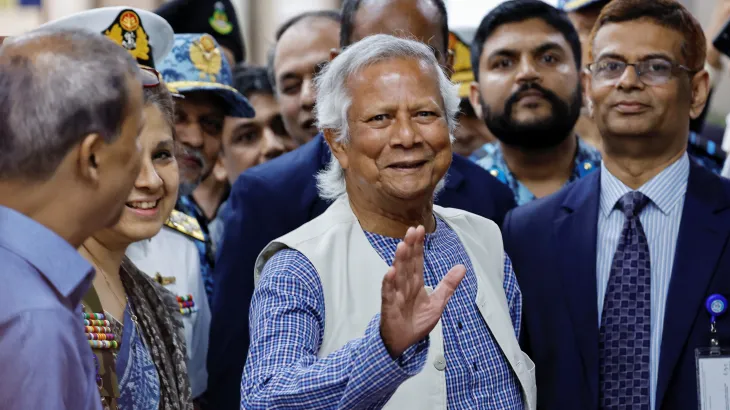
Table of Contents
In an unprecedented move, Muhammad Yunus, the Nobel laureate and globally recognized pioneer of microfinance, has returned to Bangladesh to lead a new interim government. This development marks a significant moment in Bangladesh’s political history, reflecting the nation’s search for stability and credible leadership during a period of intense turmoil. Yunus’s return to the political arena raises questions about the future of Bangladesh’s governance, the role of technocrats in leadership, and the potential impact of his leadership on the country’s socio-economic landscape.
Background and Context
Bangladesh has been in the grip of political and social unrest for several years, with tensions reaching a peak in 2024. The situation escalated to a breaking point following widespread protests against the government of Sheikh Hasina, driven by dissatisfaction with her administration’s policies and governance. The protests were fueled by a combination of economic grievances, corruption allegations, and a perceived erosion of democratic institutions.Muhammad Yunus
As the situation deteriorated, Sheikh Hasina resigned from her position, leaving a power vacuum that the military was quick to fill. However, recognizing the need for a civilian face to lead the country through this challenging period, the military-backed interim administration extended an invitation to Muhammad Yunus to take on the role of interim leader. Yunus, who has long been an advocate for social justice and economic empowerment, accepted the challenge, marking his return to the forefront of Bangladesh’s national stage after years of focusing on his international work.
Muhammad Yunus: A Brief Profile
Muhammad Yunus is no stranger to leadership or controversy in Bangladesh. Born in 1940 in Chittagong, he rose to international fame as the founder of Grameen Bank, an institution that pioneered the concept of microcredit, which provides small loans to impoverished individuals without requiring collateral. His work with Grameen Bank earned him the Nobel Peace Prize in 2006, shared with the bank itself, for his efforts to create economic and social development from below.
Yunus has always been more than just a banker; he is a social entrepreneur with a vision for a world without poverty. His approach to development focuses on empowering individuals through financial independence, particularly women, and promoting social business models that prioritize societal good over profit. Despite his achievements, Yunus’s relationship with the Bangladeshi government has been fraught with tension, particularly with Sheikh Hasina’s administration, which accused him of overstepping his role as a banker and dabbling in politics.
In 2011, Yunus was controversially removed from his position at Grameen Bank, a move that many saw as politically motivated. Since then, he has remained a respected global figure but had largely stayed away from the domestic political scene in Bangladesh. His return as the leader of the interim government is thus both surprising and symbolic, representing a bridge between his earlier work in economic development and his current role in navigating Bangladesh through its political crisis.
The Interim Government’s Mandate
The interim government led by Muhammad Yunus has been tasked with stabilizing the country, restoring public confidence, and paving the way for free and fair elections. Given his background, Yunus is expected to bring a focus on transparency, accountability, and economic reform to his leadership. His administration is likely to prioritize rebuilding trust in public institutions, addressing corruption, and implementing policies aimed at reducing poverty and inequality—issues that have been central to his life’s work.
One of the immediate challenges Yunus faces is uniting a deeply divided nation. The protests that led to Sheikh Hasina’s resignation were symptomatic of broader societal divisions, including class tensions, religious differences, and regional disparities. Yunus’s reputation as a non-partisan figure, coupled with his global stature, may help him navigate these divisions and foster a more inclusive political dialogue. However, the success of his interim government will depend not only on his leadership but also on the support he receives from other political actors, the military, and the international community.
Economic Reforms and Social Justice
Economic policy is likely to be a cornerstone of Yunus’s interim government. His tenure at Grameen Bank demonstrated his commitment to creating economic opportunities for the poorest segments of society. As interim leader, Yunus is expected to push for economic reforms that promote inclusive growth, support small and medium-sized enterprises (SMEs), and address structural issues in the Bangladeshi economy that contribute to inequality.
Yunus’s leadership may also bring renewed focus to social justice issues. Throughout his career, he has emphasized the importance of social business—a model that prioritizes social objectives over profit. This approach could influence government policies, particularly in areas such as healthcare, education, and environmental sustainability. Yunus has long advocated for investments in human capital, arguing that empowering individuals, particularly women and marginalized groups, is key to sustainable development.
Given the current economic challenges facing Bangladesh, including high levels of unemployment, inflation, and a growing wealth gap, Yunus’s economic philosophy may resonate with many Bangladeshis who feel left behind by the previous government’s policies.
International Relations and Global Support
Yunus’s appointment as interim leader has been welcomed by the international community, which views him as a stabilizing force in a volatile situation. His global reputation and extensive network of connections could be crucial in securing international support for Bangladesh during this transition period. Donor countries, international financial institutions, and development agencies are likely to view Yunus’s leadership favorably, potentially leading to increased aid and investment.
In conclusion, Muhammad Yunus’s return to Bangladesh to lead the interim government represents a critical juncture for the country. His leadership offers a unique opportunity to address the underlying issues that have plagued Bangladesh for years, including economic inequality, corruption, and political instability. If successful, Yunus’s tenure could set the stage for a more inclusive and democratic future for Bangladesh. However, the challenges ahead are formidable, and much will depend on Yunus’s ability to unite the nation and implement meaningful reforms in a short period.







